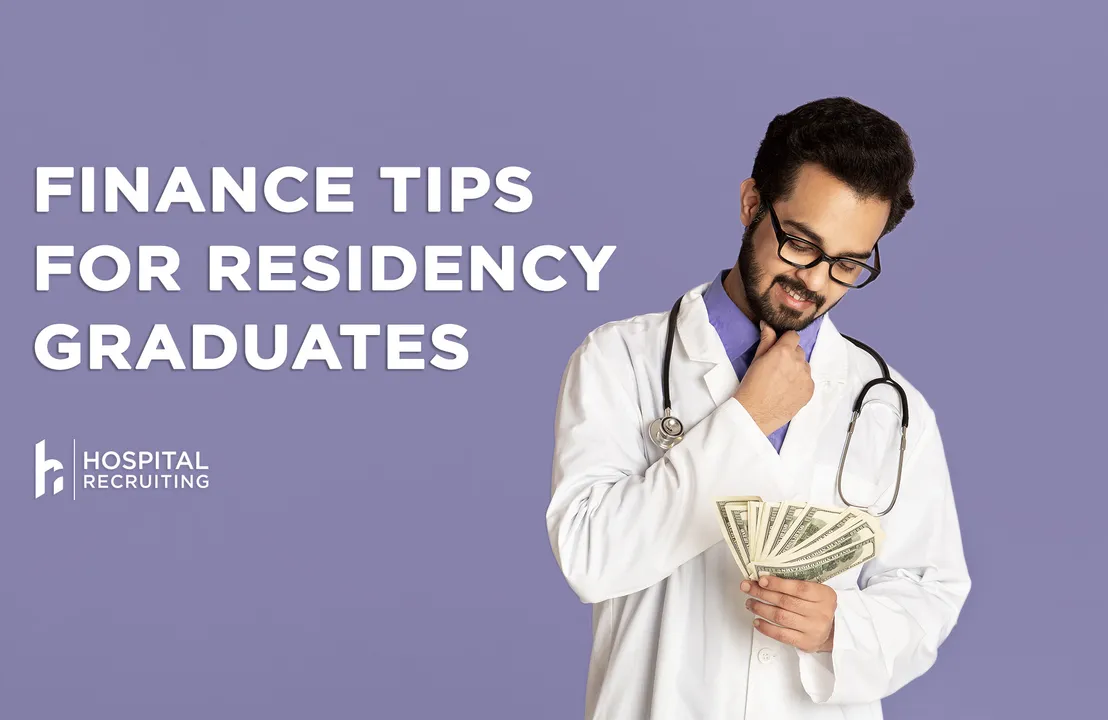Finance Tips for Residency Graduates

Congratulations on this profound achievement! You’ve worked your tail off, persevered, and now it’s time to make some serious cash. Before lying on a bed of dollars, though, here are just a few tips.


1. Don’t touch your loans until you get advice from a loan officer or financial advisor. You may be tempted to consolidate, refinance, whatever, but just as you spent 12 years becoming a doctor, seek a professional who also went to graduate school in finance. You may be able to sign a contract with your new employer that has loan repayment benefits. Consolidating causes loans to capitalize, which means the interest that’s accumulated gets added to the principal, which may not be the best decision. It may be better to pay off the higher interest loans first, then tackle the lower interest. Regardless, don’t make any serious decisions without an advisor.
2. Pay off credit card debt first, or wherever the interest rate is highest. Depending on how much you owe, it may be prudent to refinance these loans to get a lower interest rate.
3. Seriously evaluate your disability insurance. Many residents choose to keep the same plan they had in residency, but be sure to read the fine print. Most employers will offer this as a benefit, but be sure that you’re getting the maximum benefit, not something as meager as 50% of your salary.
Be sure that it covers any kind of incomplete disability. For example, if in a mountain biking accident, you break your left wrist, you can’t operate for up to 6 months. (I had a friend who ended up getting as little as $1,500/month when he needed surgery; he didn’t realize how terrible his employer’s disability package was).
4. Build your credit score. This will allow you to refinance any high interest loans, whether that be your student loans, the house, car, etc. If needed, seek a local credit union to help you repair your credit. Or just watch some " target="_blank" rel="noopener noreferrer">YouTube videos.
5. Don’t feel pressured to pay off your loans immediately. I struggled with tremendous anxiety initially when I cowered beneath my loans. In a mad dash, I set up a 5-year repayment plan with insane monthly payments, just wanting to be free of debt (prior to medical school, I was debt free). Which leads us to the next tip.
6. Balance paying off debt vs retirement and investing. This is where you absolutely need a financial advisor. Mine counseled me that it was foolish to pay off my loans in just 5 years, because I needed to be putting an equal amount toward retirement. Due to the public service loan forgiveness program, among a few others, there are ways to get your loans reduced or forgiven, making my 5-year plan completely unnecessary. You have numerous options - it’s important to research and explore them all with your advisor. I mean, I even had a friend leave the country (not that I advise that at all)!
7. Save between 3-6 months of cash in an emergency fund. Physicians used to have job security; however, that has changed dramatically since politics shoved its way in and the COVID-19 pandemic hit. Hospitals are closing, people are relocating. During the COVID-19 shut down, several hospitals simply stopped scheduling ER doctors instead of laying them off. I had one friend who wasn’t scheduled for a shift for three months. It’s important to always have a few months of cash on hand.
8. Enjoy yourself. If you’re like me, I drove my grandpa’s Buick Century all during college and medical school. She served me well, and I loved her (I named her Louis), but it was time. While I didn’t run out and spend tremendous amounts of money, I did treat myself to a new car. Most financial articles encourage saving as much as possible, but I believe it’s important to balance this a bit. You’ve worked incredibly hard for so long.
Treat yourself, just a little. You earned it.
**Editor's Note: For more financial tips, the author has another article for residents and those in medical school.**
Related Posts
